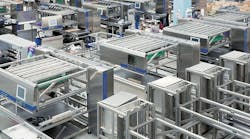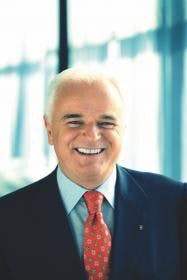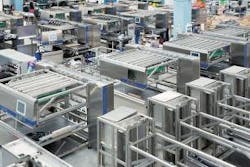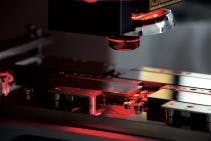System Group, an international industrial-automation enterprise based in Italy, recently created a special department—named Digital Industrial Design—to study opportunities with Industry 4.0. The team, comprised of electronic engineers, mechanical engineers, IT engineers, chemists and physicists, aims to create an Industry 4.0 model for the worldwide ceramics sector.
Smart Industry chatted with Franco Stefani, president and founder of System Group, to learn more.Smart Industry: Why this initiative now?
Franco Stefani: We are redesigning industrial production through the analysis of pre-existing processes that have to be changed to face digitalization. We need to know at what stage we are and where we want to go.
Smart Industry: What were the greatest findings that came out of Digital Industrial Design’s research?
Franco Stefani: The personalization of products and the reduction of costs and quantities are the new challenges faced by today's manufacturing industry. The changeover from large-scale production to production of small series or single products requires a high degree of manufacturing agility. In this scenario, the human assets, complete digitalization of processes and effective use of data all represent essential factors. These things are vital to the creation of a new manufacturing paradigm.
We are working on a platform of software services aimed at controlling the production capacity of entire factories, optimizing the quality of control processes and the standardization of information received from systems in order to provide management tools that improve awareness and decision-repeatability.
This is a product-analysis tool hosted on highly integrated and cutting edge IT systems, which use modern concepts to reduce costs, improve business processes and should standardize the industry. Thanks to a single graphic interface of the latest generation and the use of 3D technologies, the production facilities can be represented as a whole, dynamically, enabling a holistic view of the entire production cycle where all systems are connected and can share information on feedback or the alignment of processes, which enables us to improve the process itself in real time.
System is aiming toward robotic automation, which will enable machinery for the ceramics industry to change production without the need for operator intervention, all by entering production set-up data via the interface.
Our products are increasingly personalized and the customer is a key contributor right from the embryo phase of the product. We have a flexible production and offer tailor-made service as well as predictive maintenance. It does not matter where the customer is located—our presence is global.
For the purposes of predictive maintenance, we have developed an innovative system for remote-data acquisition, which consists of a software package capable of establishing levels of user rights to perform specific operations and to take control of the machine interface.
Smart Industry: Why make this role change?
Franco Stefani: For several years we have been involved in a process of digitalization, to offer our clients “smart manufacturing” solutions that, previously, were highly complex. The great challenge is to create a digital industry through the analysis of the pre-existing processes. In our factories we use cutting-edge software and hardware systems that bring together the virtual and real worlds. This paves the way for a new industrial approach centered around a strong human-machine bond in keeping with the most advanced HMI concepts. For example, we have recently established a new state-of-the-art facility dedicated to the production of vertical storage solutions. The company, Modula based in Lewiston, Maine, has a new plant…a 102,000 square-foot production-and-engineering space. Modula is a great example of smart manufacturing, as everything is connected. The drawings of the parts go directly to the machines and the process takes place automatically to obtain the finished components. We have an inline automated job shop that gives the plant the speed, flexibility and capabilities to transform the sheet into a finished part. Orders determine whether the line produces in a single-piece flow, kits or batches. OPS software controls the machines and the material-handling and it communicates with material-requirement-planning and enterprise-resource-planning systems to create programs and manage production flow. The manufacturing processes are integrated and flexible and have created higher-skilled, higher-wage “smart” jobs that perfectly integrate with this smart manufacturing model.
Embracing the Fourth Industrial Revolution means working toward global digitalization and implementing solutions and technologies that are transforming society and the economy as a whole, carefully taking into account the central role of process analysis.
Implementing Industry 4.0 means transforming analogue into digital. In other words, we have to work to change existing procedures in favor of digital systems, and this switch would not be possible if we weren't focused on an analysis of processes in order to understand and comprehend where we are and where we are heading. This method has been made tangible by the supervision of man, who with knowledge is able to see the process not only as an whole but also in all its parts.
System Group is characterized by our commitment to the training of young professionals. This mindset is fundamental, given that the future is created with the development of new applications and technologies. A pioneering approach must go hand-in-hand with the training of professionals. Through partnerships with schools, universities and research centers we ensure a high level of training, laying the groundwork for the specialists of the future.







